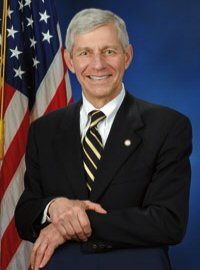PA lawmakers want independent corruption-fighting agency

By Andrew Staub | PA Independent
Two state senators this week revived a call to create an independent agency to root out corruption in Pennsylvania after another round of embarrassing ethical lapses stained the state’s reputation this year.
State Sens. John Yudichak, D-Luzerne, and Ted Erickson, R-Delaware, plan to reintroduce legislation to establish a public integrity commission to uncover and investigate public corruption in state and local government.
“It is the hope that this new, empowered agency would take Pennsylvania out from under the dark cloud of suspicion hovering over many of our governmental institutions and into the light of good, ethical government practices,” the senators wrote in memo seeking support for the legislation. “Self-policing has not worked. It is time to form an independent state agency to root out and prevent public corruption.”
ERICKSON: A previous attempt to create a Public Integrity Commission failed, but Republican state Sen. Ted Erickson sees more focus on reform this time around.
Similar legislation stalled three years ago, but after former officials with the Pennsylvania Liquor Control Board violated the state’s ethics law and a handful of lawmakers from Philadelphia were caught on tape accepting cash as part of a sting operation, Erickson said reformers have a catalyst for change.
“I think there simply wasn’t a lot of focus on it,” Erickson said of the previous push to create a public integrity commission. “And now, there is.”
In addition to taking an educational role, the commission would refer investigations to law enforcement for prosecution and would report on its work and the status of corruption investigations. It would also make recommendations for further reforms.
Part of the idea is to address corruption at more than just the personal level, Yudichak said.
“It’s too easy to dismiss corruption simply as an individual failing without looking at the institutional structures,” he said.
To “ensure that the commission has maximum ability to carry out investigations,” it would have subpoena power and could seek immunity orders to facilitate testimony in corruption probes, according to the memo.
That commission would replace the Ethics Commission, which enforces laws requiring financial disclosure and prohibiting public officials from conflicts of interest.
Fifteen possible commission members would be selected through a meritorious process, and the governor would choose seven, subject to Senate confirmation to foster a level of independence, Yudichak said. The past proposal indicated that $5 million for the commission could come from an existing surcharge on certain court filings, far more than the current $1.8 million Ethics Commission budget.
Barry Kauffman, executive director of Common Cause Pennsylvania, said his government reform group is supportive of the concept of a public integrity commission, but that the “devil is in the details.” The first step might simply be reforming the existing ethics law, he said.
There are loopholes that should be closed, such as banning public officials from sitting on corporate boards that are looking for government contracts, and requiring more detailed explanation of outside income, Kauffman said.
YUDICHAK: Democratic State Sen. John Yudichak is co-sponsoring the legislation, and Erickson hopes the bipartisan appeal helps.
There’s also the issue of independence for a state agency charged with monitoring elected officials who control the ethics commission’s purse strings and appoint commission members. Floor leaders could bring their influence to bear if the commission cracks down on their party.
“A floor leader in the House or Senate certainly doesn’t want to see the guys on his team getting in trouble,” Kauffman said. “And if the ethics commission is doing its job well and perhaps routing out corrupt officials, that might put majorities at stake in close election years.”
Robert Caruso, executive director of the ethics commission, said he hadn’t heard of the renewed efforts to create a public integrity commission, but said his agency opposed the idea before.
Rather than creating a new state agency, Caruso believes some problems could be addressed by strengthening the state’s current ethics law to include in-laws in conflicts of interest issues and reduce the reporting limits on gifts from $250 to $50.
Caruso also sees a need for more resources to better enforce existing laws. The agency’s staff has dropped from 28 to 16 since 2009, and Caruso warned that smaller cases might have to be relegated to the back-burner, while cases in outlying areas might also have to wait because of a backlog of investigations.
“We hate to make decisions like that, but it’s getting to that point where we may have to make some tough decisions,” Caruso said.
The good news is that Kauffman sees a real appetite for reform.
While some lawmakers are simply “old hacks,” there are plenty who arrive to Harrisburg with a “Mr. Smith Goes to Washington” attitude, Kauffman said. And they don’t like feeling as if they have to take a shower to wash away “sleaze” after a day at the Capitol, he said.
“There is a growing level of pressure from the public who is saying, ‘Really, another scandal? We just had one last month,’” Kauffman said. “I think there is a level of embarrassment amongst some of the leadership of both parties in both chambers. They’ve said, ‘Enough is enough already.’ So, hopefully, maybe it’s time for the grown-ups to take over.”
Andrew Staub is a reporter for PA Independent and can be reached at Andrew@PAIndependent.com. Follow @PAIndependent on Twitter for more.







